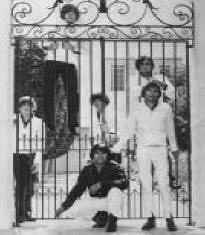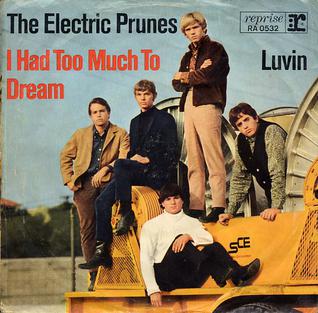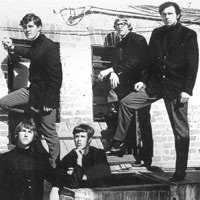Related Research Articles

Nuggets: Original Artyfacts from the First Psychedelic Era is a compilation album of American psychedelic and garage rock singles that were released during the mid-to-late 1960s. It was created by Lenny Kaye, who was a writer and clerk at the Village Oldies record shop in New York. He would later become the lead guitarist for the Patti Smith Group. Kaye produced Nuggets under the supervision of Elektra Records founder Jac Holzman. Kaye conceived the project as a series of roughly eight LP installments focusing on different US regions, but Elektra convinced him that one double album would be more commercially viable. It was released on LP by Elektra in 1972 with liner notes by Kaye that contained one of the first uses of the term "punk rock". It was reissued with a new cover design by Sire Records in 1976. In the 1980s, Rhino Records issued Nuggets in a series of fifteen installments, and in 1998 as a 4-cd box set.

The Shadows of Knight were an American rock band from Chicago, Illinois, that played a version of British blues influenced by their native city. When they began recording in 1965, the band's self-description was "the Stones, Animals and the Yardbirds took the Chicago blues and gave it an English interpretation. We've taken the English version of the Blues and re-added a Chicago touch," to which rock critic Richie Unterberger commented: "The Shadows of Knight's self-description was fairly accurate."

The Knickerbockers were an American garage rock band formed in Bergenfield, New Jersey in 1964. They released the 1965 hit "Lies", which was known for its resemblance to the Beatles. The band was formed in 1964 by the brothers Beau Charles and John Charles

The Music Machine was an American rock band formed in Los Angeles, California in 1966. Fronted by chief songwriter and lead vocalist Sean Bonniwell, the band cultivated a characteristically dark and rebellious image reflected in an untamed musical approach. Sometimes it made use of distorted guitar lines and hallucinogenic organ parts, punctuated by Bonniwell's distinctively throaty vocals. Although they managed to attain national chart success only briefly with two singles, the Music Machine is today considered by many critics to be one of the groundbreaking acts of the 1960s. Their style is now recognized as a pioneering force in proto-punk; yet within a relatively short period of time, they began to employ more complex lyrical and instrumental arrangements that went beyond the typical garage band format.

Thomas Harvey "Sean" Bonniwell was an American singer-songwriter/guitarist, who was known as the creative force behind the 1960s garage rock band, The Music Machine.

The Chesterfield Kings were a rock band from Rochester, New York, who began as a retro-1960s garage band, and who have heavily mined 1960s music, including some borrowing from the 1960s recordings of The Rolling Stones. Core members were former Distorted Level singer, underground music journalist and avid record collector Greg Prevost, and Andy Babiuk ; others have come and gone. The band, named after a defunct brand of unfiltered cigarette, was instrumental in sparking the 1980s garage band revival that launched such groups as the Unclaimed, Marshmallow Overcoat, The Fuzztones, The Pandoras, The Malarians, Mystic Eyes, The Cynics, The Optic Nerve, the Secret Service, and the Stomachmouths.

The Remains were a mid-1960s American garage rock group from Boston, Massachusetts, led by Barry Tashian. Although the Remains never achieved national success, they were very popular in New England, and were one of the opening acts on the Beatles' final US tour in 1966.
The Cryan' Shames are an American garage rock band from Hinsdale, Illinois. Originally known as The Travelers, the band was formed by Tom Doody ("Toad"), Gerry Stone ("Stonehenge"), Dave Purple ("Grape") of The Prowlers, Denny Conroy from Possum River, and Jim Fairs from The Roosters, Jim Pilster, and Bill Hughes. The band's most successful song was their cover of The Searchers' "Sugar and Spice".

The Human Expression was an American garage and psychedelic rock band from Los Angeles that released three well-regarded singles, and made additional demo recordings between 1966 and 1967.

"I Had Too Much to Dream (Last Night)" is a song written with music by Annette Tucker and lyrics by Nancie Mantz, which was recorded in late 1966 by the garage rock band The Electric Prunes. Released as the band's second single, it reached number 49 in the UK and peaked at number 11 on the Billboard Hot 100 the week ending February 11, 1967.

The Inner Mystique is the second album by the American garage rock band The Chocolate Watchband, and was released in 1968 by Tower Records.
Not to be confused with Styx (band)
The Crusaders was an American garage rock band, whose 1966 album Make a Joyful Noise with Drums and Guitars is considered one of the first gospel rock releases, or even "the first record of Christian rock".

"Pushin' Too Hard", originally titled "You're Pushing Too Hard", is a song by American rock group The Seeds, written by vocalist Sky Saxon and produced by Saxon with Marcus Tybalt. It was released as a single in 1965, re-issued the following year, and peaked at number 36 on the Hot 100 in February 1967 and number 44 in Canada in March.
"The Little Black Egg" is a song first performed by Daytona Beach, Florida garage band The Nightcrawlers in 1965. It was a minor hit in both the US and Canada, reaching number 85 on the US Billboard charts in 1967, while doing slightly better in Canada, where it hit number 74. The song has been since covered by multiple artists including Inner City Unit, The Lemonheads, Neighb'rhood Childr'n, Tarnation, The Primitives and The Cars. It was The Nightcrawlers' only hit.

No Way Out is the debut album by the American garage rock band The Chocolate Watchband, and was released in September 1967 on Tower Records. It blended both garage and psychedelic rock influences, and was marked by distorted guitar instrumentals that were early examples of protopunk. It features the band's harder-edged interpretations of songs, with only three original compositions. The album was preceded by two non-album singles, "Sweet Young Thing" and "Misty Lane", and track singles, "No Way Out" and "Are You Gonna be There ". However, none of the singles managed to chart. Like its singles, No Way Out failed to reach the Billboard 200, but it established the group as a popular live act, and later became noted as a garage rock classic.
The Bruthers were an American garage rock band from Pearl River, New York, active in the mid to late 1960s, and whose membership consisted the four brothers, Alf, Frank, Mike, and Joe of the Delia family. They recorded several songs for RCA records, of which, "Bad Way to Go" is the best known. The song is included on the compilation album, Pebbles Vol. 8, and is regarded by enthusiasts and collectors as a classic in the genre.
Garage Beat '66 Volume 2: Chicks are for Kids! is the second installment in the Garage Beat 66 series of garage rock compilations issued by Sundazed Records, which was released on April 27, 2004 and is available exclusively on compact disc. It features well-researched liner notes, written by Ugly Things publisher Mike Stax, which supply background information about each song and act, usually including photographs of the bands. Like all of the entries in the series it is noted for good sound quality, as all of the tracks are mastered from the original studio master sources.

The Remains is the debut album by the American garage rock band the Remains, and was released on Epic Records in September 1966. Though the album was largely overlooked at the time of its original release, The Remains has since received recognition as one of the more cohesive efforts of the era.

The E-Types were an American garage rock band formed in Salinas, California, in 1965. The group's sound combined striking three-part vocal harmonies and Jody Wence's jangling keyboards, with professional production techniques that were outside of the garage band norm. During the E-Types' recording career, the band released five singles, including their most notable record "Put the Clock Back on the Wall". Although the band was short-lived, the E-Types had a profound presence in San Francisco's live scene and, years after their disbandment, the group recorded a reunion album.
References
- 1 2 3 4 5 6 7 8 "We the People Biography". Allmusic . Retrieved 2010-01-08.
- 1 2 3 4 5 6 7 8 Stax, Mike (1998). Nuggets: Original Artyfacts from the First Psychedelic Era, 1965–1968 (1998 CD box set booklet). p. 74.
- ↑ "Mirror of Your Mind – Album Appearances". Allmusic . Retrieved 2010-01-08.
- 1 2 3 4 5 6 7 "We the People: Interview with Wayne Proctor". Beyond the Beat Generation. Retrieved 2010-01-08.
- 1 2 3 4 5 "Garage Days Revisited". Orlando Weekly . Retrieved 2010-01-08.
- ↑ Stax, Mike (1998). Nuggets: Original Artyfacts from the First Psychedelic Era, 1965–1968 (1998 CD box set booklet). p. 86.
- ↑ "You Burn Me Up and Down – Album Appearances". Allmusic . Retrieved 2010-01-08.
- ↑ "In the Past by The Chocolate Watchband". Allmusic . Retrieved 2010-01-08.
- 1 2 "Declaration of Independence review". Allmusic . Retrieved 2010-01-08.
- ↑ "Declaration of Independence". Rate Your Music . Retrieved 2010-01-08.
- ↑ "Mirror of Our Minds review". Allmusic . Retrieved 2010-01-08.
- ↑ "Wohn Records – Forced Exposure Online Catalogue". Forced Exposure . Retrieved 2010-01-08.
- ↑ "Too Much Noise review". Allmusic . Retrieved 2010-01-08.